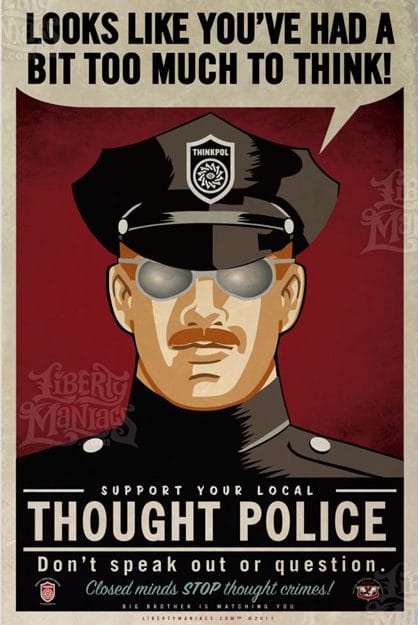This idea for my very late blog post came to me, this idea is well worth the one week overdue-ness of this post. I have read "1984" about as many times as I've read "The Perks of Being a Wallflower," "Go Ask Alice," and watched "The Big Lebowski." For those of you who don't know me personally that would be upwards of about 20 times (this is a hyperbole)...((so more like 10)). In George Orwell's dystopian novel "
1984" -just read the link to know the plot that's what it's there for-they use this new language-called newspeak-, that changes yearly just about, that is extremely basic in order to inhibit and discourage free thought. There is an entire science behind this language that you can find in the back of my mangled copy of "1984", I will explain some of it here...or I would if I hadn't lent my book to my ex-boyfriend. Anyway I was able to find some of it
here...which I will explain below.


The language follows the same grammatical rules as English except much more compressed. Many synonyms and antonyms deemed unnecessary are eliminated as well as any concepts and ideas that the Party disapproves of. "The aim of Newspeak is to remove all shades of meaning from language, leaving simple concepts (pleasure and pain, happiness and sadness, goodthink and crimethink) that reinforce the total dominance of the State. Newspeak root words serve as both nouns and verbs, further reducing the total number of words; for example, "think" is both noun and verb, so the word thought is not required and can be abolished. The party also intends that Newspeak be spoken in staccato rhythms with syllables that are easy to pronounce. This will make speech more automatic and unconscious and reduce the likelihood of thought." Another interesting fact that I found is: "Newspeak's contracted forms, such as Ingsoc and Minitrue, are inspired by the Russian syllabic abbreviations used for concepts relating to the government and society of the USSR, such as politburo, Comintern, kolkhoz (collective farm) and Komsomol (Young Communists' League), many of which found their way into the speech of Communists in other countries."
"In addition, words with negative meanings are removed as redundant, so "bad" becomes "ungood". Words with comparative and superlative meanings are also simplified, so "better" becomes "plusgood", and "best" becomes "doubleplus good". Intensifiers can be added, so "great" became "plusgood", and "excellent" and "splendid" become "doubleplus good". This ambiguity between comparative/superlative forms and intensified forms is one of the few examples of ambiguity in Newspeak."
Wikipedia did a nice job of explaining Newspeak and how it's formatted so I figured I'd just paste it there.
So why did I decide to mention Newspeak, a fictional language in an Orwell novel?
I constantly hear all the time about people griping over vocabulary sheets and wondering why we have so many words for the same exact thing. Naturally, writers love it because you can add color and flavor to your writing and because some words can take the place of 5. Education is power, and having a large vocabulary not only makes you sound smart but frees you because you have the ability to express independent thought and self expression. Newspeak exists to rob the population of their ability to have that power, which is the point Orwell was creating with that language. When I first read the book I never quite understood the concept of Newspeak and why it was so scary, I was disturbed by it but it took me a few years to understand just how serious that is.
We all know our language is shrinking because certain eloquent words have become less common and instead of have been replaced by "basic bi**" vocabulary and abbreviations such as YOLO, Facebook lingo such as "friending and unfriending" "liking and unlking" having an amount of "likes" on something? Sound like Newspeak? Everyday we are slowly becoming a monotonous culture losing our freedom of expression simply because we are not using it. I am on the verge of a political rant which is no appropriate right now so I will leave you with that to think about. Remember, language is power! Don't take it for granted.
p.s.-HAPPY GUY FAWKES DAY EVERYBODY!
Remember, remember, the 5th of November...








